-
REVIEW09-29-2022
Palliative care in Primary Health Care: an integrative literature review
Revista Brasileira de Enfermagem. 2022;75(1):e20201335
Abstract
REVIEWPalliative care in Primary Health Care: an integrative literature review
Revista Brasileira de Enfermagem. 2022;75(1):e20201335
DOI 10.1590/0034-7167-2020-1335
Views0See moreABSTRACT
Objectives:
to analyze scientific evidence on the implementation and performance of palliative care in Primary Health Care.
Methods:
an integrative literature review, according to the Preferred Reporting Items for Systematic Reviews and Meta-Analyses, carried out in the PubMed, SciVerse Scopus and LILACS databases, in December 2020, without a time frame.
Results:
22 original scientific articles were analyzed, 14 classified as evidence level VI. The objective was to understand the experiences and roles of professionals, patients and families on palliative care in Primary Health Care, articles focused on the theme of management and organization of health services and on the importance of educational interventions on the subject.
Final Considerations:
evidence found relating palliative care in Primary Health Care points to the possibility of this care; health teams work closely with the family and their home, but the need to expand this theme is still perceived.

-
REVIEW09-29-2022
Children with congenital heart disease in COVID-19 pandemic times: an integrative review
Revista Brasileira de Enfermagem. 2022;75(1):e20201033
Abstract
REVIEWChildren with congenital heart disease in COVID-19 pandemic times: an integrative review
Revista Brasileira de Enfermagem. 2022;75(1):e20201033
DOI 10.1590/0034-7167-2020-1033
Views0See moreABSTRACT
Objective:
to identify the scientific production in health about children with congenital heart disease in COVID-19 pandemic times.
Method:
this is an integrative review, carried out in June 2020 in the information resources Latin American and Caribbean Literature in Health Sciences (LILACS), National Library of Medicine, National Institutes of Health (PubMed), Scientific Electronic Library Online Journal Portal (SciELO) and Brazilian Institute of Information Science and Technology (Oasis Ibict).
Results:
14 studies composed this review. Most studies pointed to tests, interventional procedures and surgery for children with heart disease in pandemic times; others discussed possible complications of COVID-19 among children with congenital heart disease.
Conclusion:
the incipient production of studies and the weak level of evidence denote an important knowledge gap so far, highlighting the need for studies with strong scientific evidence for the formulation of care guidelines aimed at children with heart disease.
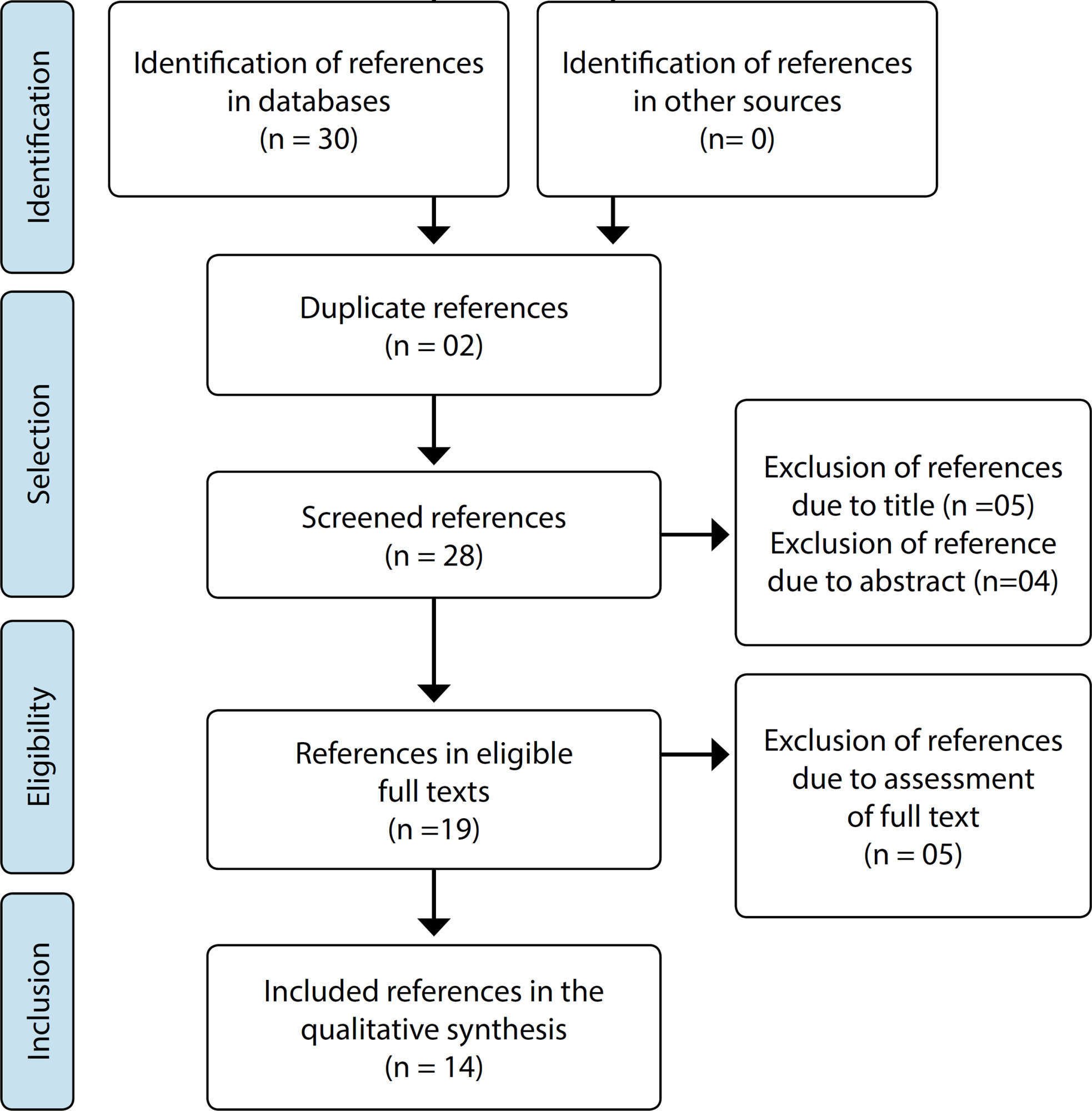
-
ORIGINAL ARTICLE09-29-2022
Palliative care production for health professionals in the context of home care
Revista Brasileira de Enfermagem. 2022;75(1):e20210030
Abstract
ORIGINAL ARTICLEPalliative care production for health professionals in the context of home care
Revista Brasileira de Enfermagem. 2022;75(1):e20210030
DOI 10.1590/0034-7167-2021-0030
Views1See moreABSTRACT
Objectives:
to analyze palliative care production developed by health professionals to home care patients.
Methods:
this is an exploratory study, with a qualitative approach, using the transpersonal care theoretical framework. Thirteen interviews were conducted with health professionals and 18 observations were conducted on different cases. Content analysis was performed using MAXQDA©.
Results:
actions performed: maintenance and follow-up measures to people eligible for palliative care, in acts of dialogue and “listening” to caregivers and users, conducting guidelines for the care and self-care process, performing technical procedures, delivery of materials, referrals and medical prescriptions to users.
Final Considerations:
it is perceived the need for advances in the implementation of government policies in Brazil that insert palliative care into the Health Care Network through educational, managerial and care actions that ensure human dignity, thus allowing the development of these and other palliative care interventions.
-
ORIGINAL ARTICLE09-29-2022
Incidence of acute radiodermatitis in women with breast cancer undergoing hypofractionated radiotherapy
Revista Brasileira de Enfermagem. 2022;75(1):e20210118
Abstract
ORIGINAL ARTICLEIncidence of acute radiodermatitis in women with breast cancer undergoing hypofractionated radiotherapy
Revista Brasileira de Enfermagem. 2022;75(1):e20210118
DOI 10.1590/0034-7167-2021-0118
Views0See moreABSTRACT
Objective:
To estimate the incidence and degree of acute radiodermatitis at the end and after the end of treatment in women with breast cancer undergoing hypofractionated radiotherapy.
Methods:
Observational, prospective, and longitudinal study, conducted between March 2019 and January 2020, in a radiotherapy outpatient clinic.
Results:
Thirty-two women participated in the study, among whom, in the last session of hypofractionated radiotherapy, 15 (46.9%) had radiodermatitis, erythema in 13 (40.6%), and wet peeling in 2 (6.3%). In the post-treatment evaluation, 27 (84.4%) had radiodermatitis, erythema in 17 (53.1%), dry peeling in 8 (25%), and wet peeling in 2 (6.3%).
Conclusion:
The general incidence of radiodermatitis after hypofractionated radiotherapy in women with breast cancer was 37.5%, erythema, 12.5%, and dry peeling, 25%. The development of care protocols for the management of radiodermatitis after treatment is of paramount importance.
-
ORIGINAL ARTICLE09-29-2022
Neither angels nor heroes: nurse speeches during the COVID-19 pandemic from a Foucauldian perspective
Revista Brasileira de Enfermagem. 2022;75:e20201329
Abstract
ORIGINAL ARTICLENeither angels nor heroes: nurse speeches during the COVID-19 pandemic from a Foucauldian perspective
Revista Brasileira de Enfermagem. 2022;75:e20201329
DOI 10.1590/0034-7167-2020-1329
Views1See moreABSTRACT
Objective:
to analyze the processes of meaning production, based on the speeches of nursing professionals, about how they feel about the titles of “angels and heroes” given by society during the pandemic of COVID-19.
Methods:
a qualitative, documentary research. Data was collected in October and November 2020 and analyzed from the perspective of the Discourse Analysis proposed by Michel Foucault.
Results:
they were organized into two thematic categories: “Angels and heroes? The (not) heroic reality of nursing during the pandemic” and “The search for recognition of the professional work of nursing: between what is said and what is not said”.
Final considerations:
the nurses’ speeches enunciate the search for decent conditions for the execution of care, fair wages, and recognition of the professional work by society.
-
EXPERIENCE REPORT09-29-2022
Mobile pre-hospital care reorganization during the COVID-19 pandemic: experience report
Revista Brasileira de Enfermagem. 2022;75:e20200826
Abstract
EXPERIENCE REPORTMobile pre-hospital care reorganization during the COVID-19 pandemic: experience report
Revista Brasileira de Enfermagem. 2022;75:e20200826
DOI 10.1590/0034-7167-2020-0826
Views0See moreABSTRACT
Objective:
To describe the reorganization of Belo Horizonte’s Mobile Emergency Care Service during the new coronavirus pandemic using the Plan Do-Check-Act quality tool.
Methods:
Descriptive study, of the experience report type, on the reorganization of care in a mobile pre-hospital care service during the new coronavirus pandemic, from March to July 2020. The Plan-Do-Check-Act quality tool was applied for the process.
Results:
Preparation of care protocol, meetings, training, addition of ambulances, hiring of professionals, and other actions were carried out, with subsequent evaluation and monitoring. When failures or new needs were identified, actions and changes were implemented while keeping monitoring and evaluation during the work routine.
Final considerations:
The reorganization of the service through the construction of a protocol and using the Plan-Do-Check-Act as a management tool was essential to promote safe care for professionals and patients.

-
REFLECTION09-29-2022
Health care of deaf persons during coronavirus pandemics
Revista Brasileira de Enfermagem. 2022;75:e20201036
Abstract
REFLECTIONHealth care of deaf persons during coronavirus pandemics
Revista Brasileira de Enfermagem. 2022;75:e20201036
DOI 10.1590/0034-7167-2020-1036
Views0See moreABSTRACT
Objective:
To reflect about the barriers experienced by the deaf population during the COVID-19 pandemic, the proposals to overcome communication barriers in health care and the role of public policies in effecting the social inclusion of deaf people.
Methods:
Reflection based on studies on health care for deaf people, the COVID-19 pandemic and public accessibility policies.
Results:
The global crisis of COVID-19 has deepened pre-existing inequalities in the world, in addition to highlighting the vulnerability of people with disabilities, including deaf. Government, institutional and social initiatives to mitigate difficulties in communicating to deaf people have been made, but they are still insufficient to guarantee protection for them in this pandemic and full inclusion in health care.
Final considerations:
Social inclusion, supported by law, and the linguistic accessibility of deaf people still need to generate broad and concrete actions so that deaf people can enjoy their rights as citizens.
-
REFLECTION09-29-2022
Hemodialysis in the context of COVID-19: care, nursing protagonism and quality
Revista Brasileira de Enfermagem. 2022;75:e20201077
Abstract
REFLECTIONHemodialysis in the context of COVID-19: care, nursing protagonism and quality
Revista Brasileira de Enfermagem. 2022;75:e20201077
DOI 10.1590/0034-7167-2020-1077
Views0See moreABSTRACT
Objective:
To reflect on the need to reorganize satellite dialysis units to ensure the safety of patients and workers, focusing on minimizing the risk of contamination by SARS-CoV-2.
Methods:
Reflection considering the guidelines of international and Brazilian institutions and scientific articles, with a view to possible adaptations to the Brazilian reality.
Results:
The actions suggested and adapted by Dialysis Units from different countries during the pandemic focus on the quality of care and safety of the patient and workers. There was an opportunity to reflect on these actions using the Donabedian Model for quality of care and highlight the nursing team’s role in this context.
Final considerations:
The focus on quality and safety related to institutionalized processes and the assessment through indicators can contribute to the management of the outpatient dialysis unit in the context of COVID 19.
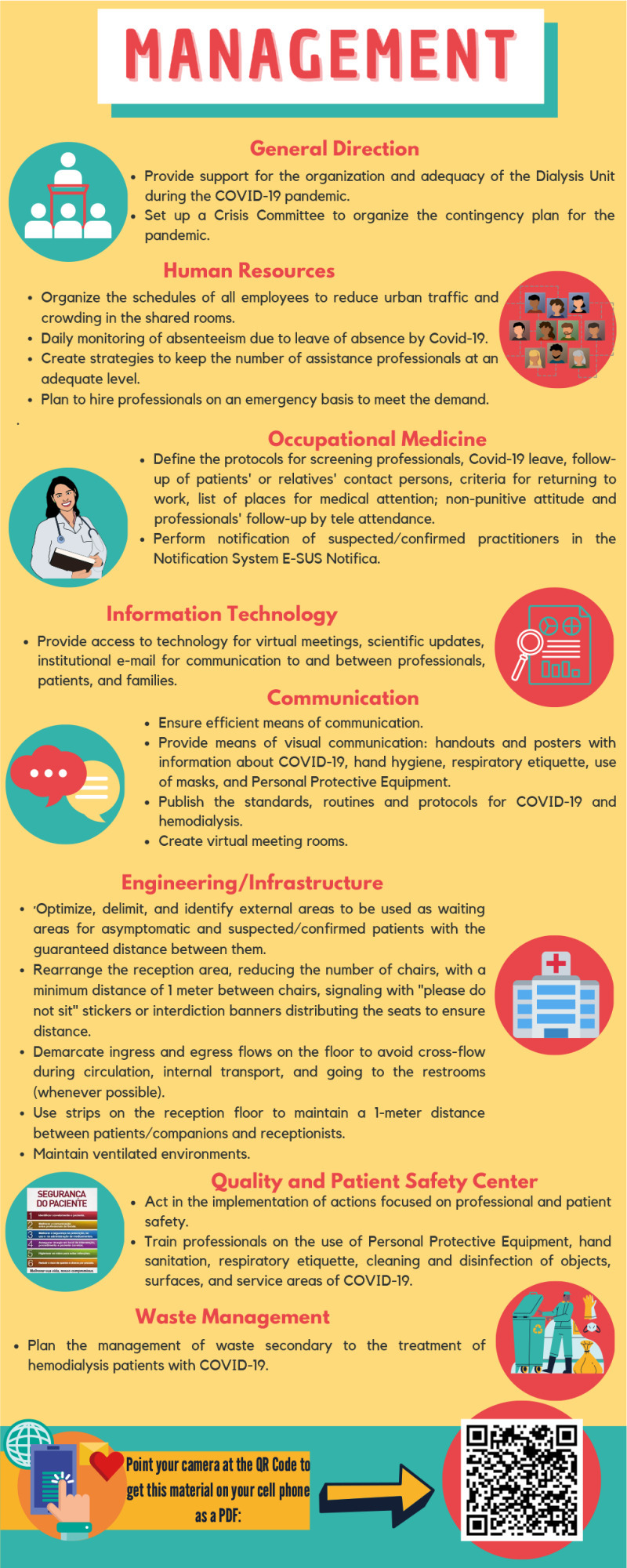
-
ORIGINAL ARTICLE04-09-2020
Factors associated with the discontinuance of outpatient follow-up in neonatal units
Revista Brasileira de Enfermagem. 2020;73(3):e20180793
Abstract
ORIGINAL ARTICLEFactors associated with the discontinuance of outpatient follow-up in neonatal units
Revista Brasileira de Enfermagem. 2020;73(3):e20180793
DOI 10.1590/0034-7167-2018-0793
Views1See moreABSTRACT
Objectives:
to identify predisposing and enabling factors as well as the health needs associated with the discontinuance of outpatient follow-up of newborns who were hospitalized at neonatal intensive care unit.
Methods:
cross-sectional study, using the behavioral model of health services use. The study was composed of 358 mothers and newborns referred to the outpatient follow-up after discharge. Characterization, perception of social support, postnatal depression, and attendance to appointments data were collected, analyzed by the R software (3.3.1).
Results:
outpatient follow-up was discontinued by 31.28% of children in the first year after discharge. In multiple regression analysis, the chance of discontinuance was higher for newborns who used mechanical ventilation (OR = 1.68; 95%CI 1.04-2.72) and depended on technology (OR = 3.54; 95%CI 1.32-9.5).
Conclusions:
predisposing factors were associated with the discontinuance of follow-up; enabling factors and health needs did not present a significant association. Children with more complex health conditions require additional support to participate in follow-up programs, thus ensuring the continuity of care.

-
ERRATUM02-26-2024
ERRATUM
Revista Brasileira de Enfermagem. 2024;77(1):e20160061
Abstract
ERRATUMERRATUM
Revista Brasileira de Enfermagem. 2024;77(1):e20160061
DOI 10.1590/0034-7167.20247701e03
Views2In the article “Nurses in the labor market: professional insertion, competencies and skills”, with DOI number: , published in Revista Brasileira de Enfermagem, 2017;70(6):1220-6, on page 1225:Include before REFERENCES:[…]See more -
REVIEW12-08-2024
Interventions for Strengthening General Self-Efficacy Beliefs in College Students: An Integrative Review
Revista Brasileira de Enfermagem. 2024;77(1):e20230192
Abstract
REVIEWInterventions for Strengthening General Self-Efficacy Beliefs in College Students: An Integrative Review
Revista Brasileira de Enfermagem. 2024;77(1):e20230192
DOI 10.1590/0034-7167-2023-0192
Views0See moreABSTRACT
Objective:
To assess the evidence regarding the effectiveness of interventions aimed at strengthening self-efficacy beliefs in college students.
Methods:
Integrative Review conducted on the Lilacs, PubMed, CinahL, Cochrane Collaboration Databases, Scopus, and PsycInfo databases. The methodological quality of the studies was assessed using tools proposed by the Joanna Briggs Institute, and the results were analyzed descriptively.
Results:
Out of the 10 selected studies, six demonstrated that interventions aimed at strengthening self-efficacy were effective (Levels of Evidence II and III), and four revealed contrary results (Levels of Evidence I and II). Programs aimed at enhancing self-efficacy should include content on positive mental health, psychoeducation strategies, cover a period of eight to twelve weeks, and consider the completion of homework assignments.
Conclusion:
The synthesis of evidence pointed to pathways for building an effective self-efficacy strengthening program to be implemented in universities.

-
ORIGINAL ARTICLE05-13-2024
Generalized Resistance Deficits in inmates with hypertension: missing resources that limit health
Revista Brasileira de Enfermagem. 2024;77(2):e20230246
Abstract
ORIGINAL ARTICLEGeneralized Resistance Deficits in inmates with hypertension: missing resources that limit health
Revista Brasileira de Enfermagem. 2024;77(2):e20230246
DOI 10.1590/0034-7167-2023-0246
Views0See moreABSTRACT
Objective:
to understand the Generalized Resistance Deficits of people deprived of liberty with hypertension in a Brazilian prison unit.
Method:
qualitative research, anchored in Salutogenesis, carried out with 38 people with hypertension from a Brazilian prison unit, from February to July 2022, with a semi-structured interview with open-ended questions, whose analysis was thematic, explaining the limitations to health in prison.
Results:
13 Generalized Resistance Deficits were reported, mostly related to the prison environment and, to a lesser extent, to the social group and the individual, respectively. Living in prison for people with hypertension implies living with a high number of Generalized Resistance Deficits, accentuating the movement towards the disease pole.
Final considerations:
knowing Generalized Resistance Deficits allows directing health promotion to support the use of available Generalized Resistance Resources and contributes to the expansion of intersectoral policies.

-
ERRATUM06-14-2024
ERRATUM
Revista Brasileira de Enfermagem. 2024;77(2):e2024n2e05
Abstract
ERRATUMERRATUM
Revista Brasileira de Enfermagem. 2024;77(2):e2024n2e05
DOI 10.1590/0034-7167.20247702e05
Views2In the article “Educational technologies used to promote self-care for people with diabetes mellitus: integrative review”, with DOI number: , published in Revista Brasileira de Enfermagem, 2023;76(Suppl 4):e20230049, in the title:Where it read:[…]See more -
ERRATUM06-14-2024
ERRATUM
Revista Brasileira de Enfermagem. 2024;77(2):e2024n2e06
Abstract
ERRATUMERRATUM
Revista Brasileira de Enfermagem. 2024;77(2):e2024n2e06
DOI 10.1590/0034-7167.20247702e06
Views2In the article “Is there scientific relevance to the plot of films and documentaries about eating disorders?”, with DOI number: , published in Revista Brasileira de Enfermagem, 2024;77(1):e20220547, page 7:Where it read:[…]See more -
REVIEW07-29-2024
Profile of scientific production on nursing technology construction, validity and application: a bibliometric study
Revista Brasileira de Enfermagem. 2024;77(3):e20230452
Abstract
REVIEWProfile of scientific production on nursing technology construction, validity and application: a bibliometric study
Revista Brasileira de Enfermagem. 2024;77(3):e20230452
DOI 10.1590/0034-7167-2023-0452
Views1See moreABSTRACT
Objective:
to analyze the profile of scientific production on nursing technology construction, validity and application.
Methods:
this is a bibliometric study, carried out in six databases, based on the Methodi Ordinatio application, arranged in nine stages. To represent the findings, the VOSviewer® software was used.
Results:
346 studies were identified, obtained from BDENF, CINAHL, EMBASE, LILACS, PubMed/MEDLINE, Scopus and Web of Science. There was a predominance of the English language, and 20% of the authors hold more than 25% of studies. Only two journals account for 25% of studies in the period studied. Twenty-six studies were selected for the InOrdinatio classification. Nursing Process (23%) stood out among the studies. The most produced technology was software (27%), and 50% of works describe construction and validity.
Conclusions:
there is an emphasis on the creation of educational technologies, especially information technology. The data demonstrates opportunities for future research in the area.

-
ORIGINAL ARTICLE01-10-2024
Inventory of ethical problems in mobile pre-hospital care
Revista Brasileira de Enfermagem. 2024;77:e20230539
Abstract
ORIGINAL ARTICLEInventory of ethical problems in mobile pre-hospital care
Revista Brasileira de Enfermagem. 2024;77:e20230539
DOI 10.1590/0034-7167-2023-0539
Views1See moreABSTRACT
Objective:
to construct and validate the content of an inventory of ethical problems experienced by nurses in mobile pre-hospital care.
Method:
a psychometric approach study, developed with the following stages: (1) instrument construction through a theoretical matrix based on deliberative bioethics, scoping review and online qualitative research; (2) content validity by judges; (3) pre-testing with Mobile Emergency Care Service nurses in various Brazilian states. For content validity analysis, the Content Validity Ratio was calculated (CVR>0.45 for judges and CVR>0.35 for the target population).
Results:
the instrument had 44 items, distributed across four dimensions.
Final considerations:
the constructed instrument presented sources of evidence of content validity, providing good psychometric measurements and constituting a useful tool for nurses’ practice in the pre-hospital setting.

-
REVIEW07-29-2020
Frailty syndrome in the elderly: conceptual analysis according to Walker and Avant
Revista Brasileira de Enfermagem. 2020;73:e20190601
Abstract
REVIEWFrailty syndrome in the elderly: conceptual analysis according to Walker and Avant
Revista Brasileira de Enfermagem. 2020;73:e20190601
DOI 10.1590/0034-7167-2019-0601
Views0See moreABSTRACT
Objective:
To analyze the concept of “frailty syndrome” in the literature, according to the method proposed by Walker and Avant.
Methods:
It is a concept analysis, guided by the method proposed by Walker and Avant, made operational through an integrative literature review. The search in a scientific database was carried out using the descriptors: Frail elderly, syndrome, phenotype, geriatric assessment, and aging. The literary corpus comprised 66 studies. Results: The study found the antecedents and attributes (categorized as physical, sociodemographic, and behavioral/environmental) that integrate the signs and symptoms evidenced in the “frailty syndrome,” as well as the consequences of this concept. The variables were analyzed with emphasis on the conceptions that influence the frailty process of the elderly.
Conclusion:
The study demonstrated the complexity arising from the multifactorial genesis of the referred syndrome, emphasizing the specificities of the elderly’s frailty. However, we recommend conducting further research involving the phenomenon in question to understand the construct better.
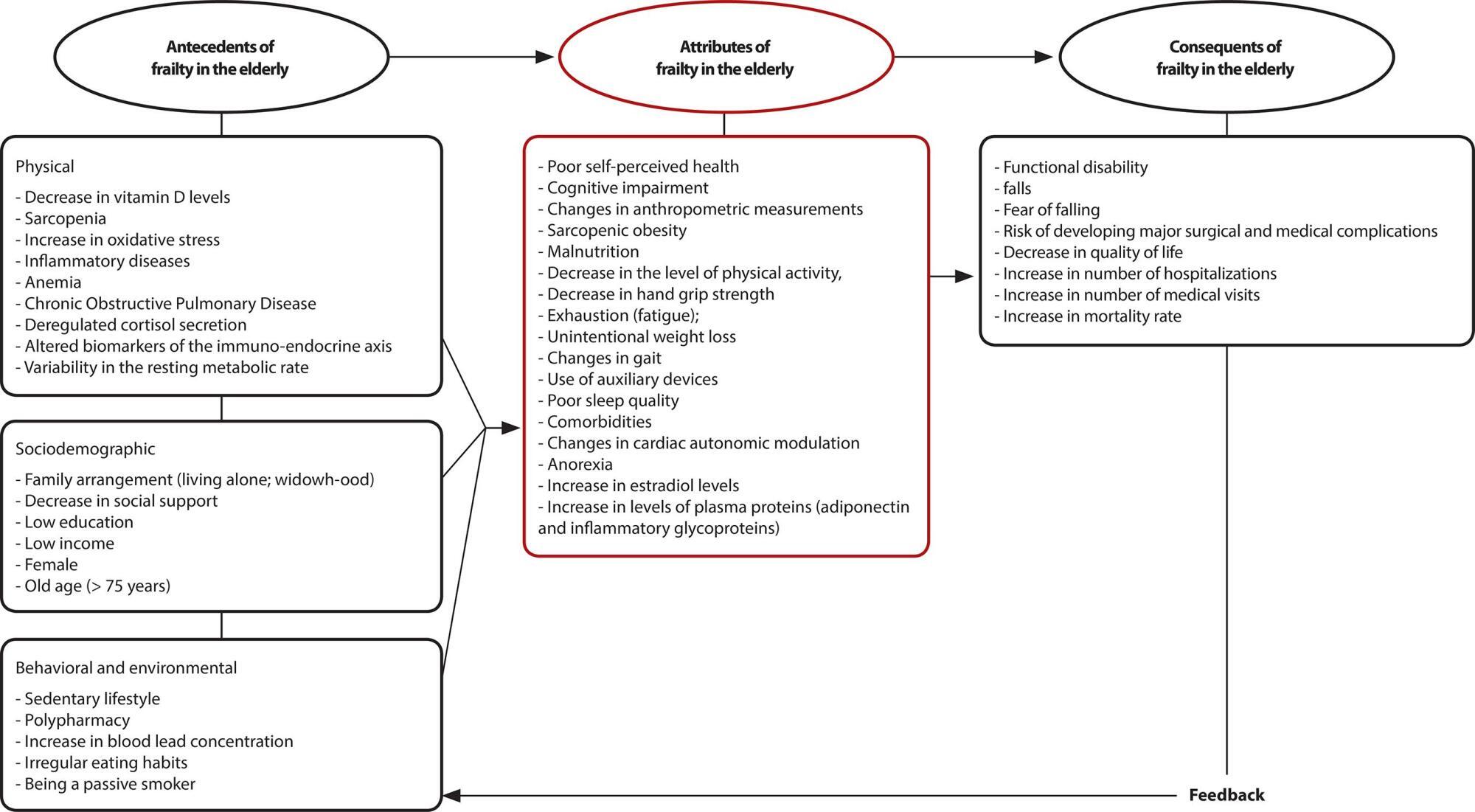
-
ORIGINAL ARTICLE09-16-2019
Tuberculosis: health care and surveillance in prisons
Revista Brasileira de Enfermagem. 2019;72(5):1304-1310
Abstract
ORIGINAL ARTICLETuberculosis: health care and surveillance in prisons
Revista Brasileira de Enfermagem. 2019;72(5):1304-1310
DOI 10.1590/0034-7167-2018-0260
Views0See moreABSTRACT
Objective:
To identify tuberculosis-related health care and surveillance actions in Prison Health Units.
Method:
Cross-sectional study, of quantitative, exploratory and descriptive character. We visited 13 Teams of Prison Health, and nurses and technicians were interviewed regarding epidemiological surveillance instruments, physical structure and materials.
Results:
Search for respiratory symptoms in admission was reported by 6 (46.2%) of the teams, and the smear microscopy was the most requested test. The Logbook of Respiratory Symptoms and the Logbook for Monitoring Tuberculosis Cases were used in 7 (53.8%) institutions. Two of them (15.4%) had a location for sputum collection and 1 (7.7%) had a radiographer. The Directly Observed Therapy was reported in 7 (53.8%) units.
Conclusion:
Health care actions related to the search for respiratory symptoms and Directly Observed Therapy should be expanded, as well as surveillance actions and recording in official documents of the National Tuberculosis Control Program.
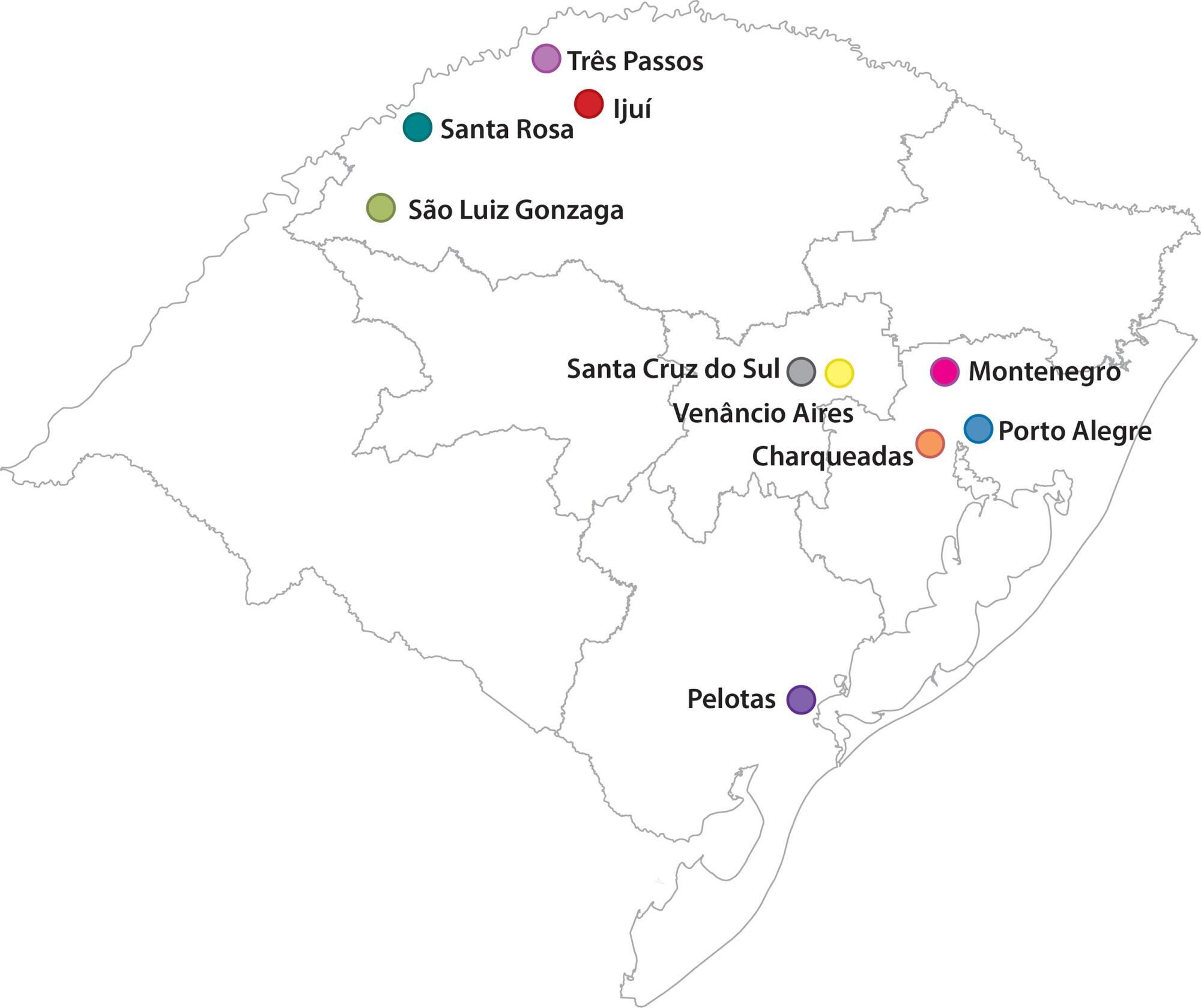
-
04-14-2021
COVID-19 patients in prone position: validation of instructional materials for pressure injury prevention
Revista Brasileira de Enfermagem. 2021;74:e20201185
Abstract
COVID-19 patients in prone position: validation of instructional materials for pressure injury prevention
Revista Brasileira de Enfermagem. 2021;74:e20201185
DOI 10.1590/0034-7167-2020-1185
Views0See moreABSTRACT
Objective:
to perform the content and face validation of a checklist and a banner on pressure injury prevention in patients in prone position.
Method:
this is a methodological study of content and face validation with 26 nurses with specialization. Professionals assessed the checklist and the banner in relation to clarity, theoretical relevance, practical relevance, relation of the figures to the text and font size. The Content Validity Index was calculated for each item, considering one with a value equal to or greater than 0.8 as valid.
Results:
all the actions described in the checklist and in the banner had a Content Validity Index greater than 0.80, with standardization of verbal time and esthetic adjustments in the banner’s layout, as suggested.
Conclusions:
the checklist and the banner were validated and can be used in clinical practice to facilitate pressure injury preventions in patients in prone position.
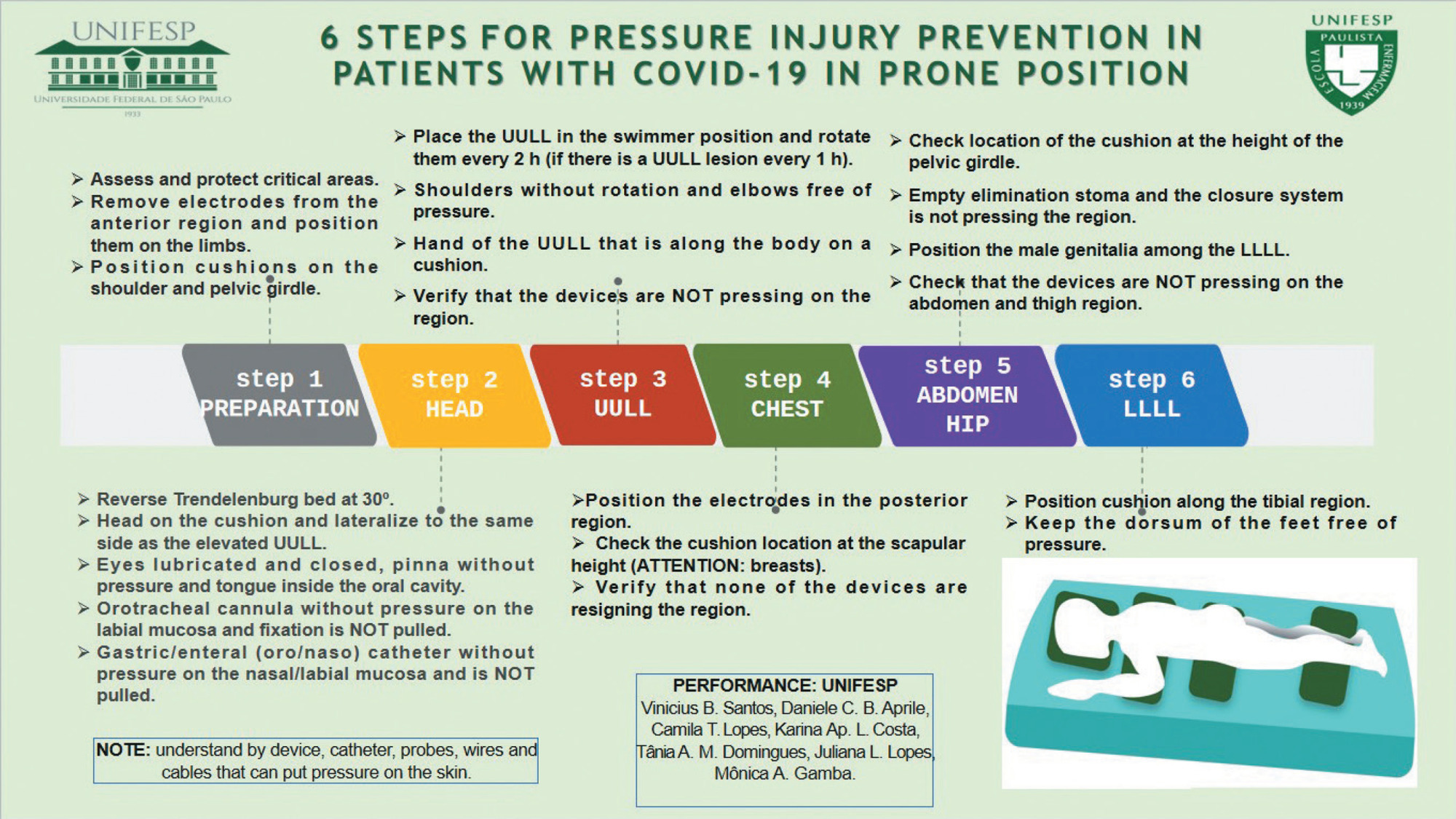
-
02-10-2020
Development of middle-range theories in nursing
Revista Brasileira de Enfermagem. 2020;73(1):e20170893
Abstract
Development of middle-range theories in nursing
Revista Brasileira de Enfermagem. 2020;73(1):e20170893
DOI 10.1590/0034-7167-2017-0893
Views0See moreABSTRACT
Objective:
To identify in the literature how Middle-Range Theories (MRT) are being developed in Nursing.
Method:
Integrative review on the databases Lilacs (Latin American and Caribbean Literature in Health Sciences), Scopus, Cinahl (Cumulative Index to Nursing and Allied Health Literature), Web of Science and PubMed portal, using the keywords middle range theory and nursing, as well its Portuguese correspondents (Lilacs), and the Boolean operator AND. The sample included 25 articles.
Results:
All articles presented concepts related to MRT. Most developed a synthesis picture. Some theories have formulated specific propositions, hypotheses, and names. Only 16 articles cited the methodological framework, while 22 used theories or models for theoretical foundation and 11 carried out literature reviews.
Final considerations:
The development of MRT included the presentation of fundamental concepts, synthesis, propositions, hypotheses and specific name. The MRT is recognized as a way of developing knowledge to guide the nursing practice.
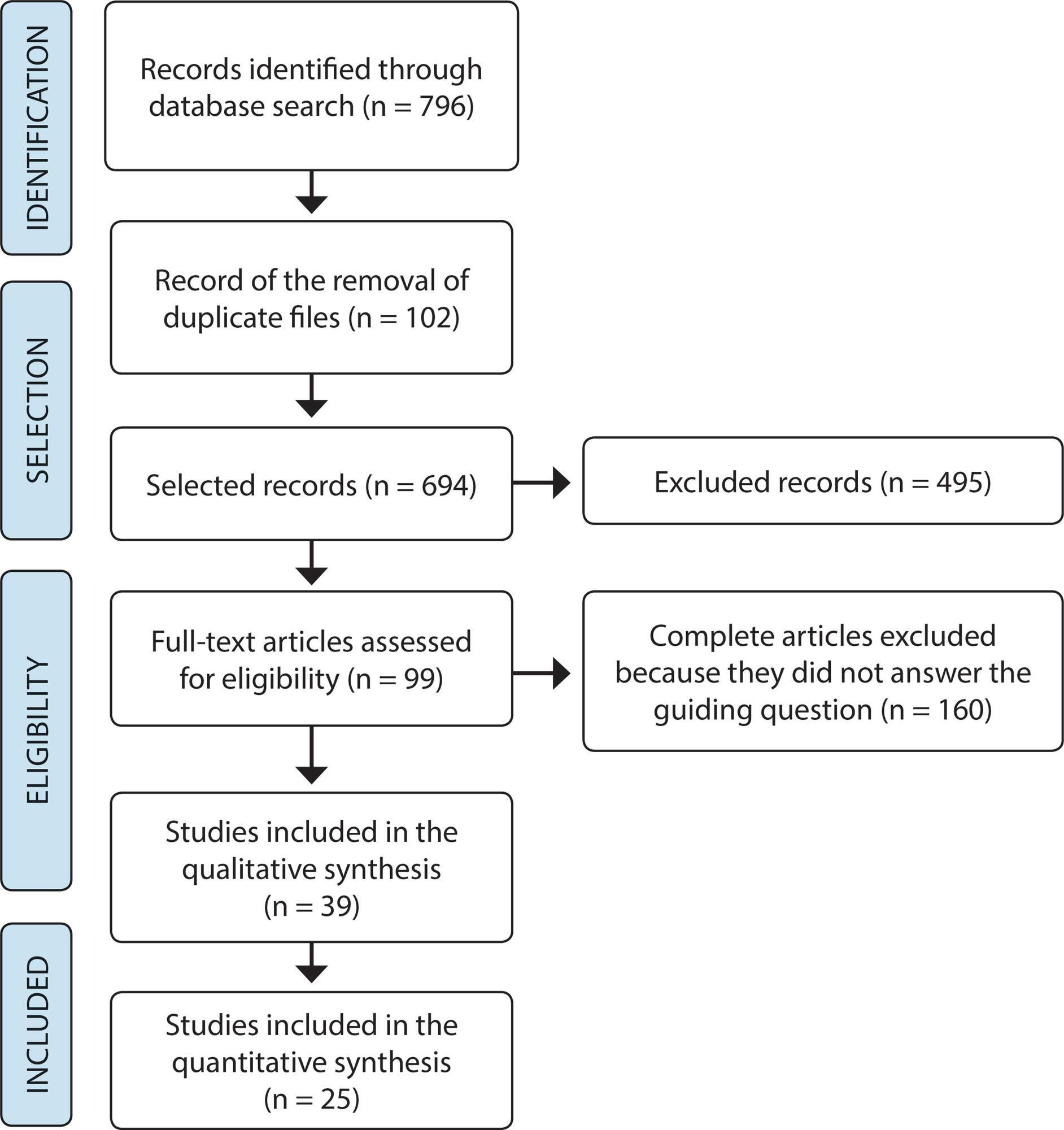
-
09-16-2019
Construct validation: coping with HIV/AIDS in Primary Health Care
Revista Brasileira de Enfermagem. 2019;72(5):1173-1181
Abstract
Construct validation: coping with HIV/AIDS in Primary Health Care
Revista Brasileira de Enfermagem. 2019;72(5):1173-1181
DOI 10.1590/0034-7167-2018-0734
Views0See moreABSTRACT
Objective:
To validate the construct and measure the trustworthiness of a questionnaire aimed at assessing HIV/AIDS coping actions developed by health professionals in Primary Health Care.
Method:
A methodological study carried out with 397 primary health care professionals in two municipalities in the Northeast region of Brazil. The construct validity was developed by the exploratory and confirmatory factor analysis, and the reliability analyzed by the reliability and reproducibility.
Results:
The validation determined six factors retention that composed the six domains of the questionnaire. Internal consistency was 0.91 and quality of the confirmatory analysis adjustment was 0.998 for Goodness of Fit Index. The domains presented Kappa values between 0.833 and 0.997.
Conclusions:
The final questionnaire was composed of 18 items and presented feasibility of application, and potential to evaluate actions for HIV/AIDS control in Primary Health Care.
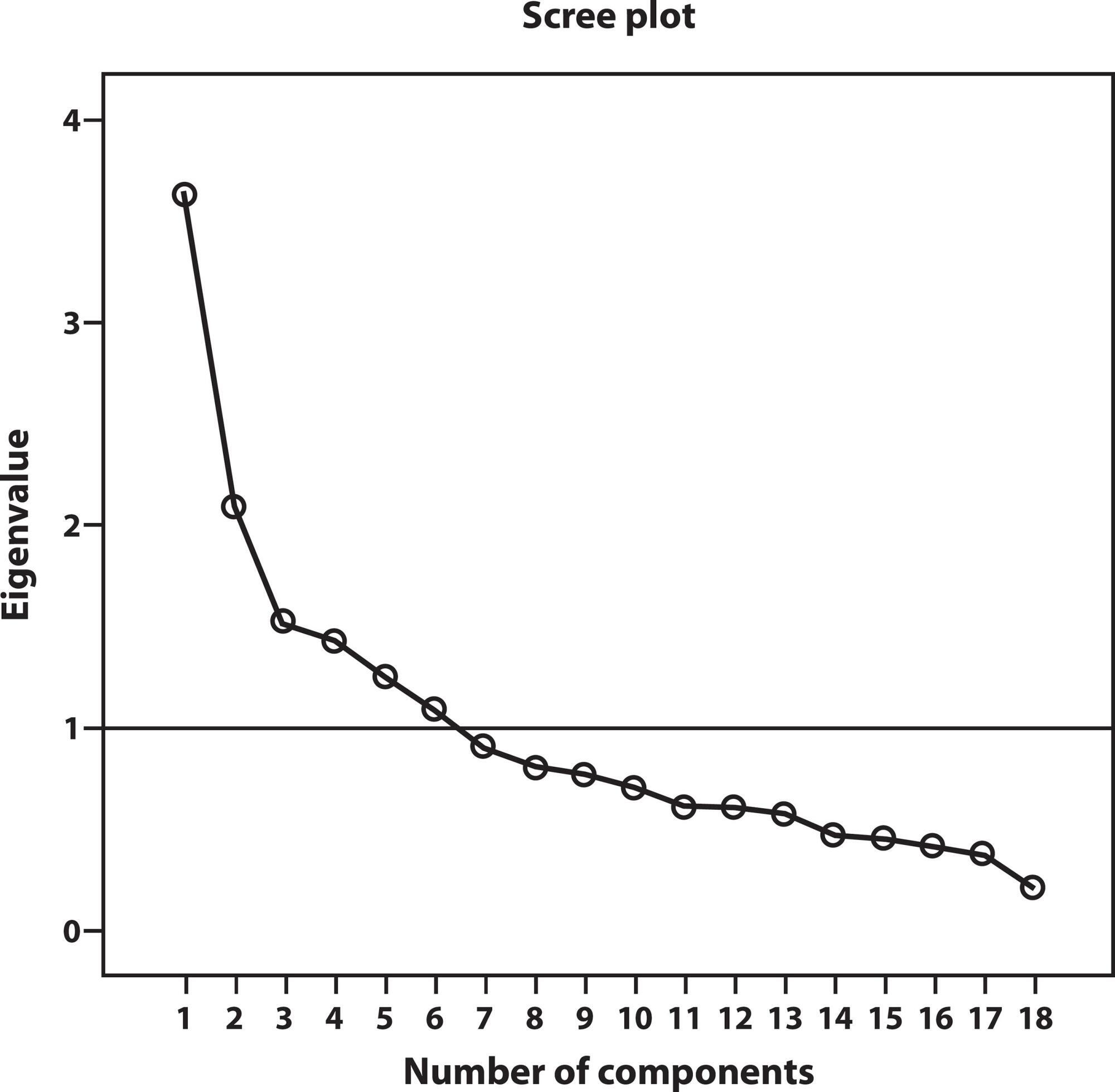
-
ORIGINAL ARTICLE02-10-2020
Stress and health risk behaviors among university students
Revista Brasileira de Enfermagem. 2020;73(1):e20180035
Abstract
ORIGINAL ARTICLEStress and health risk behaviors among university students
Revista Brasileira de Enfermagem. 2020;73(1):e20180035
DOI 10.1590/0034-7167-2018-0035
Views0See moreABSTRACT
Objective:
To analyze the level of stress and its relationship with health risk behaviors among university students.
Method:
Cross-sectional analytical study carried out at a higher education institution in Picos-PI. A total of 377 students were evaluated for socio-demographic and academic variables, stress profile, sleep quality, alcohol use, smoking habits and level of physical activity. The Statistical Package for the Social Sciences (SPSS), version 20.0 was used for data processing and analysis.
Results:
Sleep quality was poor for 65.3% of the subjects, and sleep disturbances were found in 17.0%. Stress was observed in 68.7% of the sample. Stress was associated with the following variables: gender, time in the institution, poor sleep quality.
Conclusion:
Most of the students evaluated present some level of stress associated with poor sleep quality, which is a risk to the quality of life of these individuals.
-
ORIGINAL ARTICLE03-24-2021
Self-care of people with intestinal ostomy: beyond the procedural towards rehabilitation
Revista Brasileira de Enfermagem. 2021;74(1):e20200088
Abstract
ORIGINAL ARTICLESelf-care of people with intestinal ostomy: beyond the procedural towards rehabilitation
Revista Brasileira de Enfermagem. 2021;74(1):e20200088
DOI 10.1590/0034-7167-2020-0088
Views0See moreABSTRACT
Objectives:
to interpret the self-care experience of people with intestinal ostomy registered in an ostomy program, based on the framework of the Social Model of Disability.
Methods:
qualitative exploratory research, with the participation of nine people with intestinal ostomy, based on the Social Model of Disability.
Results:
majority were elderly, married, male with colostomy due to colorectal neoplasia. The self-care of these people was analyzed in two thematic groups: “Interdisciplinary assistance needed for people with intestinal ostomy” and “Self-care for the rehabilitation of the person with intestinal ostomy”. It was proved that there was a need for a specialized health team, offering information on disabilities, teaching self-care and perioperative follow-up.
Final Considerations:
when the social barriers of physical disabilities are overcome in the context of assistance for health and life, self-care will go beyond the reductionist vision of procedural care, towards comprehensive care, favoring the achievement of rehabilitation and the quality of survival.
-
03-19-2021
Production and validation of educational technology on nursing care for syphilis prevention
Revista Brasileira de Enfermagem. 2021;74:e20190694
Abstract
Production and validation of educational technology on nursing care for syphilis prevention
Revista Brasileira de Enfermagem. 2021;74:e20190694
DOI 10.1590/0034-7167-2019-0694
Views0See moreABSTRACT
Objectives:
Validate script and storyboard of a video for educational intervention on nursing care for the prevention and management of syphilis.
Methods:
Methodological design study, with quantitative analysis approach. The content and appearance of the educational video script and storyboard was validated by a committee of experts on the subject and video. They were considered validated from the agreement of 78%, calculated by means of the Content Validity Index.
Results:
There were suggestions, which were analyzed; and, where relevant, the script and storyboard were changed. The degree of agreement among the expert judges on the subject obtained a Content Validity Index (CVI) of 100%, while, with the technical experts in video, all the questions in the educational material obtained the percentage above the recommended minimum of 78%.
Conclusion:
The validated video is an important technological production and could be used in the context of health care.
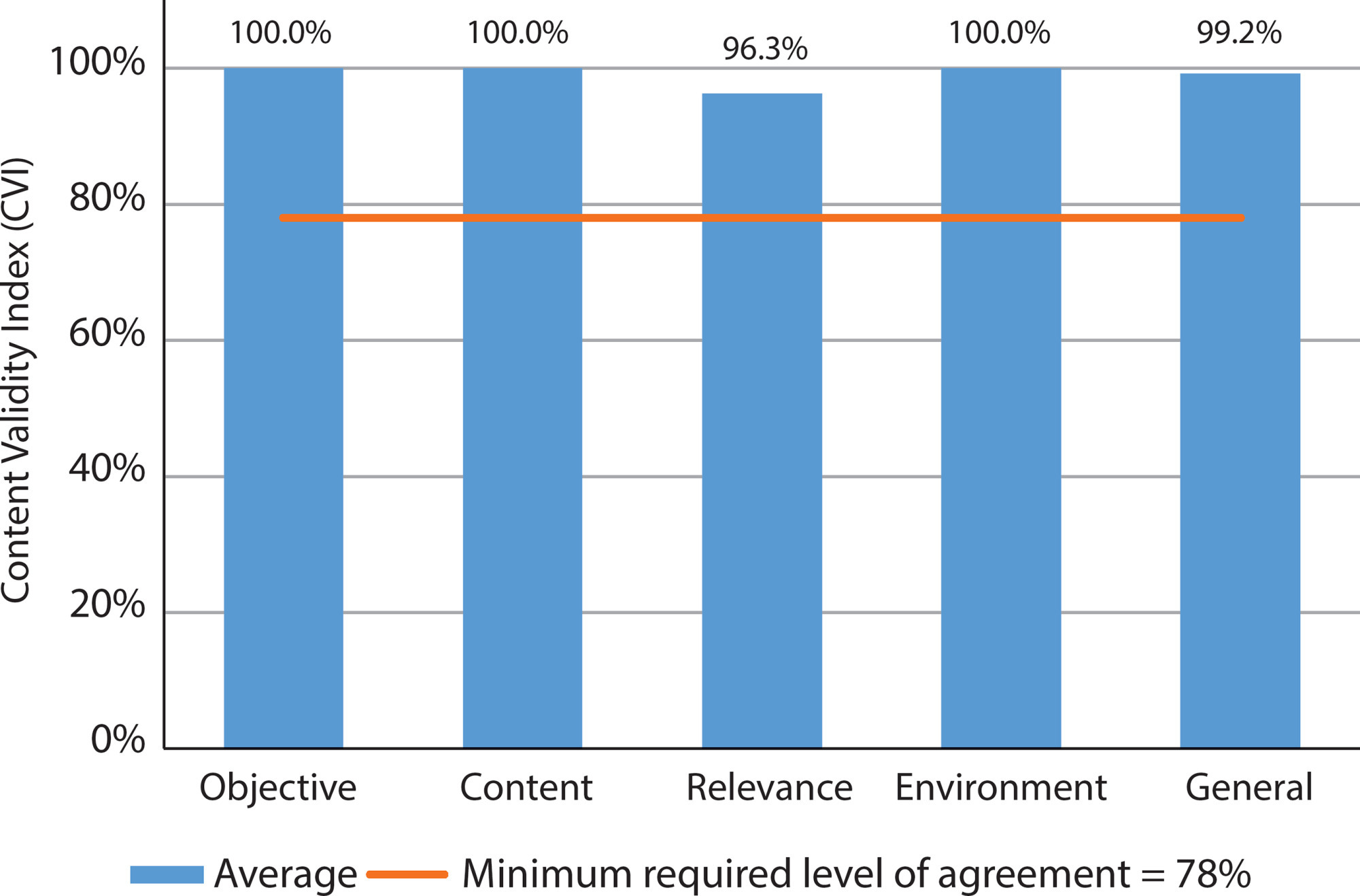
Search
Search in:
Nuvem de Tags
Adolescente (85) Atenção Primária à Saúde (239) COVID-19 (91) Criança (91) Cuidados de Enfermagem (269) Educação em Enfermagem (151) Educação em Saúde (139) Enfermagem (930) Enfermagem Pediátrica (86) Estudantes de Enfermagem (77) Estudos de Validação (131) Família (87) Idoso (208) Promoção da Saúde (99) Qualidade de Vida (104) Saúde do Trabalhador (86) Saúde Mental (145) Saúde Pública (82) Segurança do Paciente (150) Tecnologia Educacional (100)



